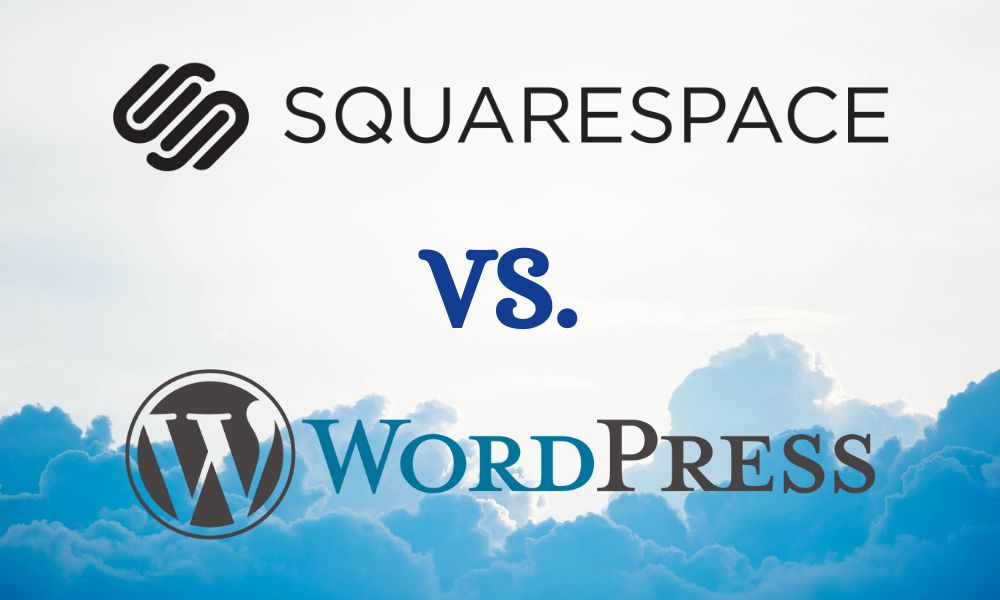Advertising disclosure
Hosting Canada is community-supported. We may earn a commission when you make a purchase through one of our links. Read Disclosure.
Squarespace vs WordPress
Squarespace and WordPress are two of the most recognized and widely used website builders and content management systems. While they each have their advantages and downsides, we have found Squarespace to be the better of the two tools.

Squarespace is a beginner-friendly website builder that allows people to create modern, stylish websites without prior website-building experience or coding knowledge making it ideal for those who want to get a website built quickly without much fuss. WordPress, on the other hand, lets users get more involved in website building making it better suited for those who want more control over their website.
Below, we will take a deeper dive into Squarespace vs WordPress as we review some of the key factors that helped us make our decision.
Ease of Use
Squarespace’s drag-and-drop website builder makes the tool far easier to use than WordPress for beginners.
Right away, Squarespace users will notice how user-friendly the platform is. From signing up to choosing a template, Squarespace makes the website-building process intuitive and stress-free. The best part about working with the platform is that there is no need for any sort of coding skills or knowledge to build an attractive website with responsive designs.
Using Squarespace's drag-and-drop editor, website owners can customize their templates and rearrange features like images, video, or text boxes on individual pages. The one downfall of Squarespace’s editor is that not all site features can be customized.
WordPress undeniably has a much larger learning curve to it compared to Squarespace. Users may find that it takes a bit of time to wrap their heads around the dashboard, how to add third-party plugins, and how to customize templates.
However, while WordPress is not as easy to use as Squarespace, it is more powerful. Using WordPress plugins, users can customize their websites to their liking. What’s more, users with skills in HTML, CSS, and PHP can even customize their own templates.
Templates
With over 1000 templates available, WordPress beats Squarespace for template designs.
As WordPress is more reliant on third-party tools and apps, it should come as no surprise that there are virtually endless templates—called Themes in WordPress— available. Within the marketplace, users can find professionally built themes, standard WordPress themes, and even user-built themes that have been uploaded to WordPress.
While sifting through these templates, it may seem difficult to choose one due to the sheer number available. However, by knowing the purpose and audience of your website, users are sure to find a great theme.
Squarespace is much more limited when it comes to templates— the platform has roughly 110 templates available. What’s more, some templates may be less customizable than others making it a challenge to personalize them.
Despite the low number of templates available, users are reportedly quite content with the quality of designs. For those who have chosen Squarespace as a website builder, no disappointments will be had with the professionally designed templates.
SEO Tools
Thanks to endless plugins and tools, WordPress has the advantage over Squarespace for SEO and marketing strategies.
WordPress websites come with some built-in SEO tools, yet most users choose to forgo them for plugins. Names such as Yoast SEO may ring a bell for any past WordPress user. SEO plugins allow users to get a deeper insight into their website’s performance, website SEO scores, and more.
What’s more, with the combination of SEO plugins and the power to tweak code, users can ensure they have the best SEO scores possible.
SEO features come built-in to Squarespace which means users don’t have to download third-party apps to improve their online presence. Through the various tools, users can change meta titles, create page redirects, create automatic sitemaps, write image alt texts, hide pages, and more.
At the same time, the lack of third-party integrations means users have fewer options for reviewing SEO strategies. Depending on how important SEO is, that may not be much of a downfall.
eCommerce
Squarespace offers built-in eCommerce features making it easier to get started compared to WordPress and its need for third-party tools.
Sticking with the trend of Squarespace’s built-in features, the out-of-the-box eCommerce features offered to Squarespace users are quite impressive. Without any extra third-party apps, users can begin selling products once their website is created. However, users need to have a business plan or higher tier plan for eCommerce features.
The premium Squarespace plan has 0 transaction fees and includes label printing, abandoned cart recovery, advanced analytics, gift cards, and much more.
When it comes to eCommerce websites with WordPress, users need to download an eCommerce plugin like WooCommerce. This special plugin has many powerful tools and features that make selling products online easy. Features include inventory management, various payment methods like credit cards and PayPal, shipping options, and support for both digital and physical products.
WooCommerce is also customizable allowing users to fully manage their website. However, it has to be set up in addition to your WordPress website making the initialization a bit difficult.
Plugins
WordPress offers thousands of plugins to enhance websites whereas Squarespace relies on already integrated tools.
It shouldn’t be surprising that WordPress reigns in the category of third-party integrations. WordPress is well-recognized for its numerous and powerful plugins. Users can find plugins that range from SEO support to contact forms to eCommerce tools.
What’s more, as WordPress is open-source, plugins can be and are continually created and added to the platform. This means that there is constant innovation. However, it also means that users need to be careful when selecting plugins as some may be outdated and have security risks.
Squarespace was designed to offer all the tools one needs to create a fully functional, modern website. For example, all tools needed to start an eCommerce website are already included in Squarespace. However, that doesn’t mean that there aren’t extra tools available. Users can add additional applications from the Squarespace Extensions marketplace.
While Squarespace has a marketplace for extensions, there are currently only 24 apps available. Nonetheless, users may find some of the apps that help with accounting, design, eCommerce, and customer surveys to be helpful additions.
Security
Squarespace manages security and updates for users, making it the better tool for security.
Security should always be a point of importance for website owners. Squarespace website owners are in luck as the platform manages security for its users. For example, built-in technology can check for malware and protect websites against DDoS attacks.
What’s more, all Squarespace websites come with SSL certificates. These certificates help protect websites from being hacked and website users from having their information hacked—vital protection for website owners who want a trusted website.
WordPress takes a different approach to security. Users are wholly responsible for the security of their websites. This means that WordPress users must get their own SSL certificate, update their website regularly, and perform other general website maintenance.
On top of managing security risks, WordPress site owners have to deal with troubleshooting their website if something breaks and causes a security issue. Ultimately, WordPress site owners have more work to do when it comes to website security.
Pricing
WordPress is a better value for money compared to Squarespace thanks to flexible pricing plans.
It may come as a surprise to those new to the website-building world, but WordPress software is free. To create and host a website is a different story, but to use WordPress, users do not need to pay.
To get a WordPress site up and running, users will need a domain name and a hosting provider which means the overall cost of a WordPress website can vary greatly depending on what services are used. Despite the variability in overall cost, WordPress remains more affordable for the price-conscious shopper.
Squarespace, on the other hand, charges customers a flat monthly fee based on the tier of services. What’s more, whether users choose to pay monthly or annually changes the yearly cost of a website.
The basic starter priced plans start at $23 per month if paid monthly or $16 per month if paid annually. For a basic eCommerce plan, users can expect to pay $36 per month for a monthly plan or $27 per month for an annual plan.
Site Migration
Both WordPress and Squarespace make site migrations seamless resulting in a tie.
Quick and easy migration from both services when migrating simple to moderately complicated websites. More complex sites (e.g., extensive database usage, dynamic plugins) may need to tweak more parameters after migration.
Customer Support
Squarespace has an excellent customer support team that is readily available compared to WordPress support which is not as accessible or available.
Squarespace users are in luck as the platform has a reputation for outstanding support. Users can get in touch with the customer support team through two main channels—email and live chat. Emails are monitored 24/7, although response times may vary, and the live chat is open Monday through Friday.
In addition to the customer support team, Squarespace has various resources that can help users answer questions and learn about the platform. Resources include online webinars, guides, and a community forum where users ask and answer each other’s questions.
WordPress is not as well recognized for its support as it is for other features. The platform does not have an official customer support team as it’s an open-source platform. However, support still exists—it’s just a different type of support.
WordPress has the largest user base of all website builders which means there are numerous experts around the world. Users with questions about a feature, plugin, or issue can likely find an article or forum that answers their questions. Otherwise, web hosting providers may be able to answer WordPress questions that pertain to WordPress hosting issues.
The Bottom Line
Reviewing Squarespace vs WordPress, it’s clear that both are two great solutions to the same problem. If you want to create a website—whether it’s a blog, an online store, a personal website, or a business website— both platforms will do the job. We've previously reviewed both Squarespace and WordPress if you want to learn more on each.
The deciding factor should be how much work you want to put into the website. If you’re interested in getting deeper into the weeds of website building and fine-tuning various aspects of your website, WordPress is for you. However, if you want to get your website built and published quickly, Squarespace is the better option.












